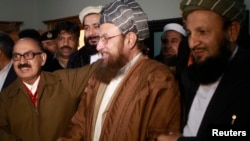ISLAMABAD —
Government peace negotiators on Thursday opened preliminary talks with representatives of the Pakistani Taliban in an attempt to end more than a decade of violent militancy in the country.
After a false start earlier this week, Pakistan government negotiators and a team of Islamist leaders picked by the Pakistani Taliban to represent them said they had sketched out the first steps on a path to peace.
Government coordinator Irfan Siddiqui emerged from the meeting saying it had been a “good day”. The government team said they had insisted on a ceasefire as the dialogue continued, that the talks remain within the parameters of the constitution, and they focus only on the insurgency in the tribal areas.
The Taliban aims to bring strict Islamic law to the country and has demanded the release of militant prisoners. Both objectives are at odds with the nation’s laws.
Siddiqui said the Taliban representatives would pass on the government’s position.
“The Taliban committee has promised that they will go to the Taliban leadership with our demands and they will not only just put these demands, but try to convince them that these are reasonable demands and then they will come back to us and will go further ahead.”
The Taliban-nominated team demanded a direct meeting with the country’s top leaders, including Prime Minister Nawaz Sharif, Army Chief Raheel Sharif, and the head of the nation’s intelligence services, General Zaheer-ul Islam.
Previous attempts at a negotiated solution to the militancy have failed.
According to state-run radio, Pakistan Interior Minister Chaudhry Nisar Ali Khan told Taliban committee leader Maulana Sami-ul Haq that the government was fully committed to the talks. The two spoke by telephone prior to the closed-door meeting.
Michael Kofman, a counterinsurgency and counterterrorism Pakistan expert at the Institute for National Strategic Studies in Washington says the Taliban agreement to talk was most likely just a stalling tactic against a military offensive.
“As long as the Taliban hold out the prospect that their differences with Pakistan’s government can be resolved with negotiations, people will not be inclined to support any kind of military offensive," he said. "And so talking is strategically very useful for them, it is very useful for them on the ground.”
Kofman said his views did not necessarily reflect those of his organization.
The Tehrik-e-Taliban Pakistan is an umbrella organization of Islamist militants fighting a bloody insurgency against the state of Pakistan.
Despite the agreement to talk about peace, militants have continued to attack security forces. The army has responded with a number of bombing raids on militant strongholds. Critics of the negotiations point to the non-stop violence as evidence that a negotiated solution to the militancy is not possible.
Prime Minister Nawaz Sharif has resisted pressure to launch a military offensive in the northwest, saying negotiations are the best solution to the violent insurgency.
On Tuesday, a planned meeting between the two committees failed when government negotiators pulled out at the last minute. Government negotiator Rustam Shah Mohmand then said meaningful talks could only be held with actual Taliban members, not their appointed representatives.
After a false start earlier this week, Pakistan government negotiators and a team of Islamist leaders picked by the Pakistani Taliban to represent them said they had sketched out the first steps on a path to peace.
Government coordinator Irfan Siddiqui emerged from the meeting saying it had been a “good day”. The government team said they had insisted on a ceasefire as the dialogue continued, that the talks remain within the parameters of the constitution, and they focus only on the insurgency in the tribal areas.
The Taliban aims to bring strict Islamic law to the country and has demanded the release of militant prisoners. Both objectives are at odds with the nation’s laws.
Siddiqui said the Taliban representatives would pass on the government’s position.
“The Taliban committee has promised that they will go to the Taliban leadership with our demands and they will not only just put these demands, but try to convince them that these are reasonable demands and then they will come back to us and will go further ahead.”
The Taliban-nominated team demanded a direct meeting with the country’s top leaders, including Prime Minister Nawaz Sharif, Army Chief Raheel Sharif, and the head of the nation’s intelligence services, General Zaheer-ul Islam.
Previous attempts at a negotiated solution to the militancy have failed.
According to state-run radio, Pakistan Interior Minister Chaudhry Nisar Ali Khan told Taliban committee leader Maulana Sami-ul Haq that the government was fully committed to the talks. The two spoke by telephone prior to the closed-door meeting.
Michael Kofman, a counterinsurgency and counterterrorism Pakistan expert at the Institute for National Strategic Studies in Washington says the Taliban agreement to talk was most likely just a stalling tactic against a military offensive.
“As long as the Taliban hold out the prospect that their differences with Pakistan’s government can be resolved with negotiations, people will not be inclined to support any kind of military offensive," he said. "And so talking is strategically very useful for them, it is very useful for them on the ground.”
Kofman said his views did not necessarily reflect those of his organization.
The Tehrik-e-Taliban Pakistan is an umbrella organization of Islamist militants fighting a bloody insurgency against the state of Pakistan.
Despite the agreement to talk about peace, militants have continued to attack security forces. The army has responded with a number of bombing raids on militant strongholds. Critics of the negotiations point to the non-stop violence as evidence that a negotiated solution to the militancy is not possible.
Prime Minister Nawaz Sharif has resisted pressure to launch a military offensive in the northwest, saying negotiations are the best solution to the violent insurgency.
On Tuesday, a planned meeting between the two committees failed when government negotiators pulled out at the last minute. Government negotiator Rustam Shah Mohmand then said meaningful talks could only be held with actual Taliban members, not their appointed representatives.










